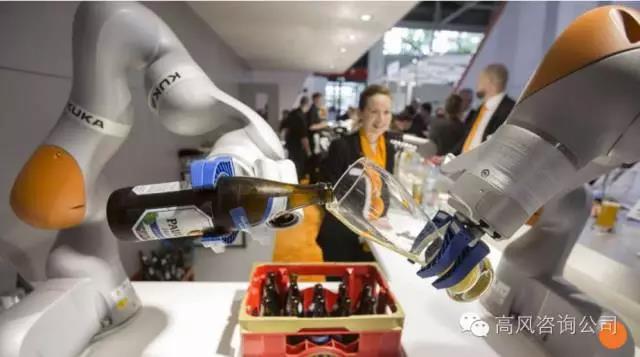
PUBLISHED : Sunday, 21 August, 2016, 10:00am
Midea’s Move for German Robot Maker Kuka May be a Turning Point for Chinese Manufacturing
Edward Tse says the takeover bid is emblematic of how Chinese companies are shaking off the copycat label in the march towards ‘Industry 4.0’ and ‘Made in China 2025’
Chinese electrical appliance manufacturer Midea’s move to acquire Kuka, the German robot maker, could be a defining moment in the evolution of China’s manufacturing sector. China’s reliance on low-cost, labour-intensive manufacturing to power its immense economy is no longer attractive, mainly due to the rise in labour and other costs. The world’s second-largest economy needs to seek alternative ways to grow and companies like Midea are showing the way.
Midea was founded in 1968 by He Xiangjian as a small township enterprise. Leading a group of residents in Beijiao, Guangdong province, He raised 5,000 yuan (HK$5,834) to establish a bottle lid production workshop. Midea has since transformed into a global player pushing the technology and innovation frontier.
It currently owns some of China’s top home appliance brands and its total group revenue globally in 2015 was over US$21 billion. Its rise epitomises the thriving Chinese innovational and entrepreneurial spirit that emerged after the economic reforms spearheaded by late paramount leader Deng Xiaoping (邓小平).
For a long time, China’s manufacturers were branded copycats (shanzhai). Even though there are still plenty of shanzhai companies around, many more established companies like Midea are transforming themselves into market leaders and disruptors through innovation, evolution, experimentation and a closer connection with consumers. Midea’s latest acquisition target marks its foray into Industry 4.0.
So why is a maker of fridges and air conditioners interested in state-of-the-art industrial robotics? The heart of the matter can be found in two key phrases, “Industry 4.0” and “Made in China 2025”.
“Industry 4.0” refers to the concept of fully automated production facilities that require minimal human involvement. This fourth stage of the industrial revolution represents the convergence of the internet of things and the control of cyber-physical systems.
‘Made in China’: the smart revolution blueprint set to bring Beijing into the digital age
“Made in China 2025” is an initiative by the Chinese government to drive manufacturing innovation, strengthen the industrial base and promote breakthroughs in key industrial sectors, with the ultimate goal of enhancing international competitiveness and improving the image of Chinese brands. It is one of the most prominent concepts in China’s 13th five-year plan.
China’s latest strategic plan not only involves acquiring foreign companies, but also embracing the principles of Industry 4.0. This was seen in the 2014 Sino-German Cooperation Action Plan under the theme “Design Innovation Together”. This plan facilitates bilateral cooperation where both countries commit to improving collaboration in areas such as mobile internet, the internet of things, cloud computing and big data, along with policy and regulatory support.
Industry 4.0 envisions a future with shortened model and upgrade cycles, and a higher degree of personalisation. For a white goods maker, it means being able to adapt quickly to changing consumer needs while reducing production overheads, costs and the capability to offer solutions based on consumers’ exact needs.
Haier is a good example of a company that has already begun its foray into Industry 4.0 territory. Its latest “Connected Factory Programme” allows it to mass produce personalised products instead of the traditional large-scale factory that only produces one type of product per cycle. Thanks to this new factory model, Haier’s customers will be able to order tailor-made products such as air conditioners that filter out methanol.
While China has traditionally enjoyed low labour costs with a comparatively higher labour-to-production ratio, its workforce of young, cheap labour has become scarce. Facing these new demographic changes, Industry 4.0 stands to shift China’s industry to more automated and labour-light practices. Fang Hongbo, Midea’s chairman, said this was a major motivating factor for their offer for Kuka.
Many regard most industries in China as still operating in the “Industry 2.0” era – a more traditional mass production assembly line system. For these manufacturers, directly diving into Industry 4.0 would be an incredibly difficult leap due to the cost of replacing and upgrading their plants and infrastructure.
This is where Kuka comes into play for Midea. By investing in Kuka, which is heavily focused on digitising its industrial manufacturing solutions, Midea stands to directly benefit from Kuka’s Industry 4.0 expertise and its vast foreign network. Kuka can provide vital technologies to help Midea build up its Industry 4.0 strategy and production lines, while Midea will assist Kuka with its expansion plan and growth strategy in China.
Stuck in the past: how China’s manufacturing powerhouse of Dongguan got left behind
The acquisition would be a turning point that might very well help Midea become part of China’s very own Industry 4.0 vanguard. Other Chinese firms that have recently acquired German companies with Industry 4.0 capabilities include ChemChina (machinery maker KraussMaffei ), Shanghai Electric Group (hi-tech equipment manufacturer Manz) and Shang Gong Group (knitting machine maker H. Stoll).
This trend in acquiring robotics and automation technologies should bring increased efficiency and production to China’s manufacturing. It will also help drive down costs for Chinese companies and assist in reaching their goals of transforming into Industry 4.0 enterprises.
Chinese manufacturers have come a long way from being shanzhai companies, and are now increasingly technology-driven and innovative. Judging from recent developments, it looks like their time has come.
Not many Chinese manufacturers may get there, but some will, and as I’ve always said: “A small percentage of a large number can still be significant.” And, those who do “make it” will serve as role models for many more to come.
Edward Tse is founder and CEO of Gao Feng Advisory Company, a global strategy and management consulting firm with roots in Greater China. He is the author of China’s Disruptors

